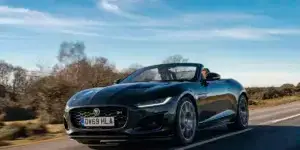What does BHP mean?
The letters bhp stand for brake horsepower. It measures the amount of power a car’s engine or electric motor generates to move it. Understanding bhp is crucial as it provides insight into a car’s performance capabilities.
Without getting too technical, a car with an internal combustion engine burns petrol or diesel, creating small explosions that spin a crankshaft. This spinning motion generates power, which is transferred to the wheels via the gearbox. In most electric cars, power is transferred directly to the wheels without a gearbox.

Why does BHP matter?
BHP offers a strong indication of a car’s acceleration and driving experience. Generally, a higher bhp means quicker acceleration. However, you must also consider the car’s weight. A heavy car with high bhp might not accelerate as quickly as a lighter car with lower bhp.
Understanding how much power you need depends on your driving habits. For city driving, a car with lower bhp might suffice. For long motorway journeys, higher bhp can maintain cruising speeds more efficiently.
Many models come with different engine options, offering varying bhp levels. Remember, cars with more bhp usually cost more to buy and run due to higher fuel consumption.
What’s the difference between HP and BHP?
Several units measure power, with bhp being one. The metric unit is horsepower (hp), often expressed as PS (pferdestärke), the German term for horsepower.
The term “horsepower” originated from engineer James Watt, who used it to compare the power of his steam engines to horses. While modern measurements differ slightly—1 hp equals 0.986 bhp—it gives a historical context to the term.
Car manufacturers often use hp or PS for official figures due to the metric system’s prevalence. However, British car magazines and retailers stick with bhp.
How is BHP measured?
BHP is measured using a dynamometer (dyno). While metric horsepower (hp) is gauged at the crankshaft as it reaches full speed, bhp factors in friction by measuring power as the crankshaft slows to a stop.

What’s a good amount of BHP?
What constitutes a ‘good’ amount of bhp varies depending on the car type and intended use. For instance, 100 bhp suffices for a small city car, while larger vehicles or frequent motorway drivers might prefer more power. Generally:
- Small cars have up to around 120 bhp.
- Family-size cars range from 120-200 bhp.
- Over 200 bhp typically indicates a high-performance car.
Luxury cars often boast several hundred bhp due to their size and weight.
How do I find out my car’s BHP?
MOTORS provides bhp details for all its cars. To check a car you already own, search online by its make, model, and engine type. Many engines offer different bhp levels due to manufacturer tuning. For exact figures, search by your car’s registration number.
Visit our jargon buster for more automotive terms simplified.

What’s the difference between BHP and torque?
Torque measures ‘work’ rather than power, given in lb/ft (pounds-per-foot) or Nm (Newton metre). If power is how fast you pedal a bike, torque is how hard you push down on the pedals.
Engines can generate high power with low torque and vice versa. The ideal engine balances both. Diesel engines and electric motors generally produce more torque than petrol engines, making them feel more effortless to drive.
Higher torque is advantageous for larger cars, those carrying heavy loads, or towing trailers, providing better fuel economy and a more relaxed driving experience.
Understanding car performance specifications
When considering bhp and torque, it’s essential to understand how they affect a car’s performance. BHP impacts a car’s ability to accelerate and maintain high speeds. Torque influences how smoothly and effortlessly a car can move, especially under load.
For a balance of both, look for cars with engines that offer robust bhp and torque figures. It ensures a versatile driving experience, whether you’re navigating city streets or cruising on the motorway.
How do I choose the right car based on BHP?
Selecting a car with the right bhp involves considering your driving needs. For city driving, lower bhp cars are sufficient and more economical. For longer journeys or higher speeds, higher bhp provides better performance and comfort.
Consider additional factors like fuel efficiency, maintenance costs, and overall vehicle weight. Higher bhp often means higher fuel consumption, so balance power needs with practical considerations.
What is the impact of BHP on fuel efficiency?
Higher bhp typically means higher fuel consumption. However, technological advancements in engine design and fuel management systems have improved efficiency even in high-bhp cars.
Hybrid and electric vehicles offer alternatives with high power outputs and better fuel economy. For example, electric cars provide instant torque and high acceleration with lower running costs.

How do I balance BHP and cost?
Cars with higher bhp generally cost more to purchase and maintain. They consume more fuel and may require more frequent maintenance. Balancing bhp with cost involves considering your budget, driving needs, and long-term expenses.
Opt for cars that offer a good balance of power and efficiency. Research different models and their performance statistics to make an informed decision.
For further information and expert advice, explore our comprehensive buying guides. Ready to find your next car? Visit MOTORS to discover a wide range of options tailored to your preferences.


